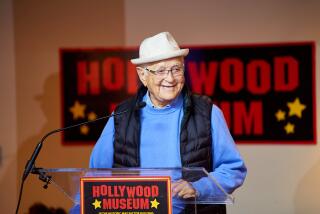Out to Pasture--and Back : ACS Specializes in Placing Retired Aerospace Executives in High-Tech Jobs
- Share via
When Litton Industries laid off Roy Zimmerman last October, it appeared that his long, productive aerospace career had come to a rather dismal end.
Zimmerman was automatically retired by Litton, since he was 68 years old. But the Ph.D. physicist, who specializes in nuclear radiation effects, was in good health and had a sharp mind. He was not ready to check out of the work force just yet.
Unknown to him, meanwhile, General Dynamics was searching for a scientist with just his talents who could work part time to help make Navy missiles more resistant to nuclear radiation.
Zimmerman and General Dynamics found each other recently through ACS Management Group of El Segundo, a small new company that specializes in placing retired aerospace professionals in part-time or temporary jobs.
“We think it is important to give people employment past the time they would be put out to pasture,” Donald R. Cates, president of ACS, said. “We don’t think it is right to waste all that talent.”
Among the 800 or so retirees that ACS has on its data base awaiting temporary or part-time jobs, for example, is a computer programmer with 20 years’ experience who has been working as a security guard while waiting to get back into his profession.
Because of the liberal retirement policies of many aerospace contractors and government agencies, thousands of qualified workers retire in their mid-50s but would like to continue working part-time.
In addition, older workers are often pressured to retire in corporate cost-cutting campaigns, either because of outright age discrimination or because their income and benefits costs are higher than those of younger workers.
ACS was founded last year by Cates, 51, and his partner, Joel Salz, 42. It operates much like larger temporary employment services, known in the aerospace industry as “job shops.” But there are some important differences.
ACS believes that it can underbid large job shops by specializing in professional retirees who often are willing to work for somewhat lower wages than younger workers. At the same time, many of the retirees offer job skills and experience that employers value, such as punctuality, a good work ethic and a lifetime of experience.
“These people are more interested in having a reason to get up in the morning than they are in making another dollar,” Cates said. “So, they can offer to work at a 15% or 20% discount to the job shops.”
John Whiteside, vice president for human resources at General Dynamics’ Pomona division, was surprised to find retirees to be a lower-cost source of high-quality labor. ACS, he said, is “doing something absolutely unique--they are charging less than other (temporary) companies.”
Typically, workers placed by ACS cost an employer $22 to $40 an hour, which includes the worker’s wage and ACS’ fees.
As for Zimmerman’s performance on his temporary job, General Dynamics is pleased.
“We had been interviewing people for this job for two years,” Whiteside said. “Mr. Zimmerman has a unique skill. We couldn’t find anybody with his skill. He filled the bill.”
Still, ACS is growing slowly. In the past year, it has placed about 40 employees, but business is picking up, and the company hopes to pass revenues of $500,000 this year.
General Dynamics is the first major prime contractor to accept an ACS placement, Cates said. The other major primes in Southern California--including Northrop, Rockwell, Lockheed, TRW, Litton Industries and McDonnell
Douglas--have declined to do business with ACS because they have exclusive contracts with the big aerospace job shops, Cates said.
Another obvious problem that older workers face is the lingering stereotype of outdated qualifications and lack of energy, but corporations are being forced increasingly to give up these biases. The National Science Foundation found in a recent study that the number of degrees in engineering and science granted by U.S. colleges and universities will fall 45,000 short of demand by 1996 and 700,000 short by 2010.
As highly qualified scientists become scarce, retirees are going to be an important national resource, according to Sally James, executive director of the Los Angeles Council on Careers for Older Americans.
“The supply of younger workers is drying up,” James said. “We have had over 20 employment agencies call us in the last six months interested in retirees.”
James said ACS is one of few services that specialize in retired professionals: “Mr. Cates is a godsend.”
Meanwhile, the highly technical work at General Dynamics has helped to restore Zimmerman’s professional vigor.
“It leaves a lack when you retire,” Zimmerman said recently. “There is a sense of frustration not having time structured.”
Zimmerman, who is married, works three or four days a week, usually taking a day off on Wednesdays, which means he works no more than two days at a time. He wants to continue to work “as long as I feel up to it.”
Although his work keeps him active, the extra income is a big incentive, he said. Thanks to his part-time earnings, he is planning a vacation in Japan later this year.
More to Read
Inside the business of entertainment
The Wide Shot brings you news, analysis and insights on everything from streaming wars to production — and what it all means for the future.
You may occasionally receive promotional content from the Los Angeles Times.











